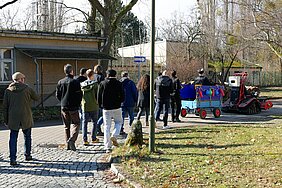Seven doctoral degrees in seven months – We are delighted for our young scientists and congratulate them on successfully completing their dissertations.
In February, Redmond R. Shamshiri defended his dissertation at the TU Berlin on the topic of “Investigation of Robust Path Tracking, Collision Avoidance, and Teleoperation for Assisted Navigation of an Agricultural Mobile Robot in Unstructured Environments.” For his dissertation, he subjected specific results from the SunBot and foodChain projects to in-depth analysis and contributed to the development of autonomous agricultural robots, for example, to avoid collisions in heterogeneous areas or with field inhabitants. He will continue to contribute his expertise on this topic to the Agromechatronics department at ATB.
He was followed in April by his colleague Giacomo Rossi who defended his doctoral thesis entitled “Insect mediated bioconversion in the circular bioeconomy: Evaluation of quality, safety and environmental impact” with an excellent summa cum laude at the Justus Liebig University Giessen (JLU). In his thesis, Mr. Rossi evaluated the use of insects to convert food waste or agricultural residues into valuable proteins that can be used as animal feed, for example in aquaculture, thereby supporting more sustainable agriculture. As part of his research work, he has been involved in projects such as AquaTech4Feed and NewFoodSystems. In addition, he played a key role in organizing INSECTA in 2024 and the new INSECTSplus congress in 2025, which took place for the first time in Cloppenburg in cooperation with the German Institute for Food Technology (DIL).
Mr. Rossi will remain at ATB as a postdoctoral researcher in the “System Process Engineering” department and will work on the BMEL project “ProtinA,” which focuses on the nutritionally optimized development of alternative protein sources through the use of innovative and sustainable processing technologies using crickets (Acheta domesticus) as an example.
In May, Laura Storch successfully defended her dissertation at the University of Kassel on the topic of “N2O emissions as response of process-related soil microbial activity to different irrigation and nitrogen fertilization regimes in potato cropping.” In her work, she analyzed microbial processes underlying the formation of nitrous oxide under different irrigation and fertilization regimes. In her doctoral thesis, Ms. Storch was able to show that nitrous oxide emissions were mainly determined by plant development stages and weather conditions, while fertilization and irrigation practices showed only minor differences. It also became clear that microbial communities formed time-related clusters over the course of the season, and full-length sequencing enabled the identification of microbial indicators for nitrous oxide formation at the species level for the first time.
Two doctoral degrees were celebrated in July:
Chau Dang defended her dissertation on “Valorization of by-products from wet coffee processing: waste to carbon-rich material using hydrothermal carbonization to improve the sustainability of the coffee value chain in Vietnam” at the TU Dresden. Her work was carried out as part of the CoffeeChar project in the System Process Engineering department at ATB and aimed to implement innovative solutions for improving sustainability in the coffee value chain with the help of hydrothermal carbonization (HTC).
Kirill Bykov successfully defended his doctoral thesis at the TU Berlin. He was awarded summa cum laude for his outstanding contributions in the field of explainable artificial intelligence (XAI). Kirill's research has advanced the understanding of neural networks. His work not only deepens the theoretical foundations of explainability, but also provides researchers and practitioners with powerful tools for interpreting their AI systems, including:
- DORA – the first method for analyzing a trained neural network without a dataset, opening up new avenues for model transparency.
- INVERT – a technique for textual explanation of neurons that bridges the gap between complex model behavior and human interpretation.
- GLOBE – an approach to breaking down the explanation of any neuron into a linear combination of labeled concepts, making explanations more interpretable and actionable.
Anna Hedström also successfully completed her doctoral thesis in the field of explainable artificial intelligence (XAI) at the TU Berlin in August with summa cum laude. Her research has significantly advanced the evaluation and reliability of explainability methods and provided the community with powerful tools for rigorously evaluating the quality of explainable AI techniques, including
- Quantus – an open-source framework that enables the use of a variety of standardized evaluation metrics for explainability methods and allows combined analysis across different metric categories to improve reproducibility and ensure more reliable XAI evaluation.
- MetaQuantus – an extension of Quantus that adds meta-evaluation functions to assess the robustness and reliability of the XAI metrics themselves.
- GEF – a threshold-free metric that uses geometry-aware measures to quantify how well an explanation aligns with the behavior of the model, enabling robust, task-independent evaluation across domains.
We are proud of the outstanding achievements of our graduates and wish them all the best and every success for the future. We look forward to hearing more from them in the future.

